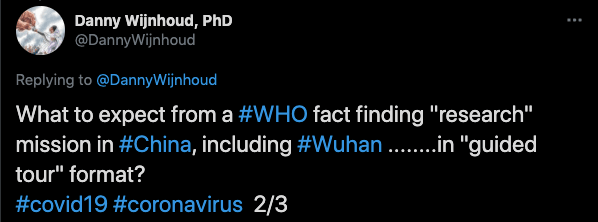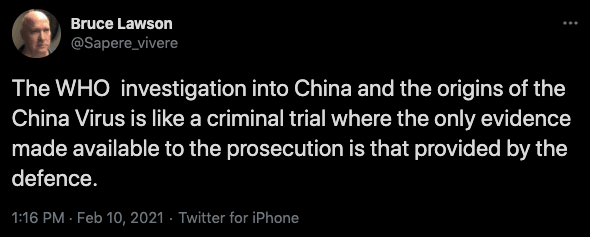The origins of COVID-19 virus, which devastated the world, its economies and claimed millions of lives, remained a mystery even over a year after the outbreak. While saying "accidents do happen," a team of international experts, including those from the World Health Organisation (WHO), investigating the origins of Covid-19 concluded that laboratory leak of the virus is "extremely unlikely." Not just that, WHO scientists now believe the deadly virus could have transmitted to humans via an animal more closely related to humans than bats, framing cats in the whole scheme of things.
Addressing a press conference at the end of the joint WHO-China study, more than a year after the initial cases of Covid-19 were reported from Wuhan in China's western Hubei province, Peter Ben Embarek, the head of the WHO mission, said more work was required to identify the source of the virus. Liang Wannian, a member of the WHO-China joint study team, said that there is no evidence of transmission of the novel coronavirus before December 2019 in Wuhan.

Suspicions relay over WHO investigations
Many experts have relayed doubts over the "inconclusive" conclusions of WHO's investigations after spending a month in China and two weeks dedicated to key sites in Wuhan. WHO scientists, who voted unanimously to rule out the possibility of virus leaking from a lab in Wuhan, spoke to scientists at the Wuhan Institute of Virology after visiting the site for inspection. Dr Embarek said the laboratory theory was "not in the hypotheses that we will suggest for future studies".
But sceptics were quick to suspect foul play. The fact that WHO's visit to Wuhan came after over a year since the outbreak and scientists had to run with the evidence provided by China. Now, it is possible that China had a whole lot of time to fabricate evidence and remove anything incriminating that would have just proved the international theories about the COVID-19's origin, sceptics have floated the idea.
"If the only information you're allowing to be weighed is provided by the very people who have everything to lose by revealing such evidence, that just doesn't come close to passing the sniff test," David Relman, a microbiologist at Stanford University, told the Washington Post on Wednesday.

Not only did WHO dismiss the idea of the virus leak from a Wuhan lab, but it also said it is possible novel coronavirus could have been circulating for weeks before it was identified in Wuhan. The latter was a statement made by head of the Covid-19 panel at China's National Health Commission and the Chinese lead on the international team of experts, Dr. Liang Wannian.
During the investigations, the scientists visited hospitals, labs, markets, including the Huanan Seafood Market, the Wuhan Institute of Virology and the Wuhan Center for Disease Control laboratory. In all likelihood, CCP had plenty of time to set up the perfect crime scene that in no way incriminates China, pointed out a user on Twitter.
Blame the cats and whatnot
After eliminating the possibility of a lab leak, WHO had to blame something. The scientists even acquitted bats for the deadly transmission to humans and suspected minks and cats to have done the ill deed. Even though bats and pangolins were potential candidates, Liang said the samples from these species were not sufficiently similar to novel coronavirus.

The much-anticipated research also suggested that Wuhan could just be one of the first places where the virus spread. The "wet market" in Huanan which was linked to some of initial human cases was also one of the focus areas of the study, but not the "point of origin."
Dr Peter Daszak, a member of the WHO team, was even willing to go as far as blaming the frozen foods imported into the country that could have possibly carried the virus. "China is a very big place and South East Asia is a very big place. The supply chains to the Huanan seafood market were extensive, they were coming in from other countries, they were coming in from various parts of China, so to really trace that back it's going to take some work," he pointed out, according to BBC.
In what could have irked Australia, which was among the first countries demanding an investigation into coronavirus origin. To much of its surprise, the investigation puts Australia under spotlight. The scientists echoed China's assertions that "cold-chain products" such as Australian beef, could have led to the initial outbreak.
Lobbying for China?
Sceptics even pointed out the mysterious delay of 1.5 hours to begin the "WHO-China joint study press conference."
"Was WHO taking notes from China," questioned a netizen.
As it appears, WHO seems to have missed the whole point of investigation.
"The WHO completes its investigation of coronavirus saying it was transmitted from animals to humans. That is not the point. The investigation needs to be on when China knew and why they kept it from the rest of the world, didn't sound the alarm, & hoarded PPE to protect China," former US Ambassador to UN Nikki Haley pointed out.



"It's as if WHO went looking for anything but the obvious," wrote one user. The WHO investigation led to more questions than answers and it is possible we'll never know for sure the origin of coronavirus, which took 2.3 million lives in a short span of one year.















